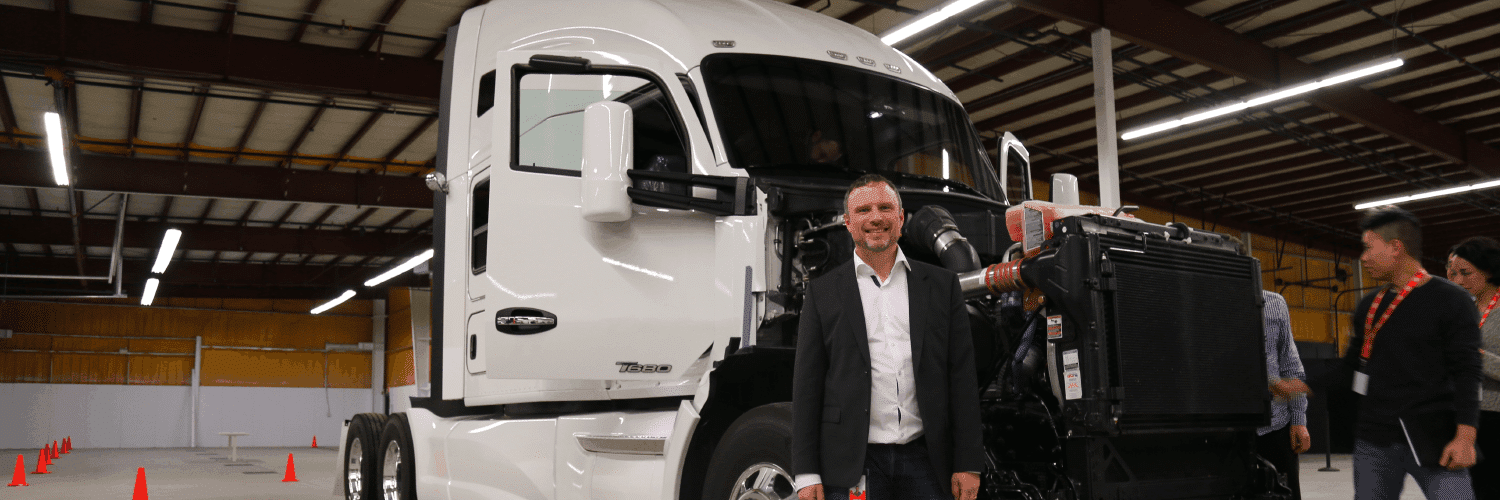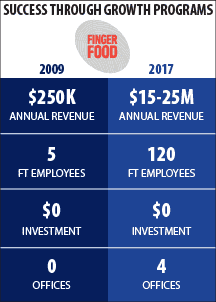
24 Jan 2017 Success Story: Interview with Ryan Peterson of Finger Food

Finger Food was one of the first companies to join BC Tech’s Growth Programs back in 2009, when they had just been founded by Trent Shumay. They began as an IOS developer but now, thanks to their adaptive strategy focusing on innovation, they currently work in the AR/VR space. Check out our interview with their current CEO, Ryan Peterson, to get insight into Finger Food’s rapid growth and the steps they took to be where they are today, as well as see photos from the launch of their new AR/VR space, the Holodeck.
Interview with Ryan Peterson, CEO of Finger Food

Q: How did the Centre4Growth, now the Growth Programs, benefit you?
A: The Centre4Growth really hooked us up with two different mentors. The first mentor was Howard Donaldson. This was before I came along. And after some consultation, Howard’s recommendation was, hey Trent; you need to find a CEO. I think he’d just really given Trent some concrete advice of, I can’t do everything myself. The next person was Rory Holland, who has maintained a very close relationship with myself. He’s not only become a mentor, but a very close friend of mine.
Q: How did Howard & Rory help you create what Finger Food has become?
A: What he (Rory) has been really good with is, just being an incredible sounding board for different ideas. We’re trying to do things differently here; to kind of write our own book. I don’t believe in copying people. So, we’re trying to innovate in how we design the company. If we’re not innovating internally, how can we tell our clients that we are innovators?
Q: How do you continually keep innovation as such a high priority?
A: Right now, we’re really focused on how do we build, I call it, a culture of curiosity. How do we build a culture that gets the best people from around the world that want to work here? And then be able to have the freedom and the safety net to go and really just use their God-given abilities. What are the rules of the game to come into an office like that? And what’s the training program?
Q: You’ve grown aggressively for almost 7 years now. Is it nerve-racking moving at such speed?
A: Yeah, no stock goes straight up. We go through consolidation phases as an organization. You can see it in our revenue chart. We’ll have this big growth and then we’ll kind of level off. Some people go, oh my God. This is bad, why aren’t we growing anymore? It’s actually a good thing. You’re compressing the spring to jump to the next level.

Q: What’s your biggest strength contributing to your Growth?
A: Today the biggest strength of our business is that we continually adapt to the market. So, people talk about pivoting the company. We pivot every year on new technologies and we’re giving that expertise to our clients. So, clients come to us to work on the next big thing. And what our major focus as a company now, is that we’re actually picking one client per industry and trying to be known as the organization that completely transformed entire industries. We’re getting tremendous success and traction with this strategy. We’re working with businesses to completely transform their entire business model around next generation technologies. We’re delivering projects that everyone now will copy. So, we’re setting that bar.
Q: Can we have an example of how you’ve done so?
A: I don’t know if people realize this, but most use clay modeling to design cars. Clay modeling was introduced in the 1930s by General Motors. And so, what happens is, you have a new idea for a car, the draftsman would draft up a car, and you’d do a clay model which takes about six months. We went from AutoCAD (a process including clay modeling) to a full sketch holographic image (a process that takes about 3 days). We’re really re-imagining the human experience around design. We took a set of instructions, and those were the same for almost 100 years, and completely changed it.

Q: Often, when businesses think of innovation, they think of powerhouses like Google & Microsoft. How does Finger Food compare to them in a potential employee’s or prospective client’s value proposition?
A: We just don’t come up with grand ideas. We’re the people that come up and actually see those ideas to fruition and deliver the product. We’re actually leveraging very mature technology from companies like Microsoft. What we tell our staff is, you can go work at Microsoft or Google on the technology or you can work on the application of the technology within business (here). You have access to the latest and greatest technology on a weekly basis. It’s a matter of implementing the technology and having the cost point come down. So, that’s where we sit on the value proposition for our clients. Every company needs to, kind of, view themselves as a tech company. How are they rethinking how they do things? I really think Vancouver can be a center pin for those transformational changes in business, because we have some of the best talent in the world here.
Q: What type of talent will you need to continue such Growth?
A: When I think of cultivating and training talent, I look at Emily Carr for instance, they produce about 500 graduates a year. It needs to be ten times that amount of graduates every year. I don’t need more engineers, I actually need more creative people, Business smart people that have a STEM education baseline. How do I apply these technologies to solving business problems?
Q: What is Finger Food’s vision for the future? What’s your five-year plan?
A: That’s a waste of time. But seriously, in five years, what will you (we, Finger Food) be working on? I’m like, I have no idea, but our strategy very simply is to continually adapt to the market. (Finger Food’s five-year plan) In 2018, adapted to the market. 2019? See 2018.
Finger Food has fundamentally built their strategy around adaptation and innovation. It is the cause for their continual growth and allows them to continuously be at the forefront of technology. Strong leadership, challenging work, and a culture of curiosity has allowed Finger Food to attract, work with, and maintain on-going relationships with clients who strive to change their industry. All of these factors combine to allow Finger Food to deliver growth statistics that will impress the best of B.C.’s tech ecosystem.
*****
We here at the BC Tech Association would like to extend a formal thank you to Ryan Peterson, Trent Shumay, and the entirety of the team at Finger Food.
For more information, visit their website at www.fingerfoodstudios.com.

